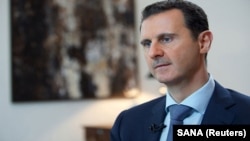Syrian President Bashar al-Assad has blamed "the mistaken policies" of the West for the rise of Islamic State and said there can be no political process in his country until "terrorists" are defeated.
The Syrian president has in the past used the term "terrorists" to describe both groups like the Islamic State and Western-backed rebels fighting the Syrian regime.
Speaking to Italian TV, Assad condemned recent terrorist attacks on France, Lebanon and Russia, saying he empathized with those who had lost loved ones, but noted that Syria has been facing similar acts of terrorism for nearly five years.
Blaming the West
Assad spoke at length about the presence of Islamic State terrorists in his country, blaming their existence on the West. He said the militant group grew and flourished in Iraq after the 2003 U.S. invasion. He noted that IS leader Abu Bakr al-Baghdadi had once been in U.S. custody in Iraq.
Dubai-based analyst Theodore Karasik told VOA he believes Assad was “not only echoing his own rhetoric of the past few years, but also the Russian message ... [about] President Putin's color-coded revolution theory,” which contends that “the West is to blame.”
The United States and other Western countries that have supported rebel fighters have long insisted Assad must go, while Syrian allies Russia and Iran have opposed those calls.
Political future
Top diplomats from 20 world powers who met in Vienna last Saturday agreed on the need to bring Syria's government and opposition representatives into U.N.-mediated talks by January 1.
Assad alluded to a possible presidential election in the future, but “only if the Syrian people decide to hold one.” He was equally vague about the timetable for such an election, noting that opposition and Western demands for an 18-month transition were not viable.
As for his own role, Assad claimed the presidency was “not his property,” and that he was merely holding the position “on behalf of the Syrian people.”
Obama on Assad
In Manila on Thursday, U.S. President Barack Obama said efforts to defeat IS will not succeed until there is a political agreement in Syria, and he does not believe a settlement should leave Assad in power.
Assad attempted to paint an optimistic scenario of a post-conflict Syria, where rival political groups participated in parliamentary elections and helped govern the country. But, he added, repeating another government position, the “political process cannot go ahead“ until “terrorism is defeated.”












